James Madison Worksheets
Do you want to save dozens of hours in time? Get your evenings and weekends back? Be able to teach about James Madison to your students?
Our worksheet bundle includes a fact file and printable worksheets and student activities. Perfect for both the classroom and homeschooling!
Resource Examples
Click any of the example images below to view a larger version.
Fact File
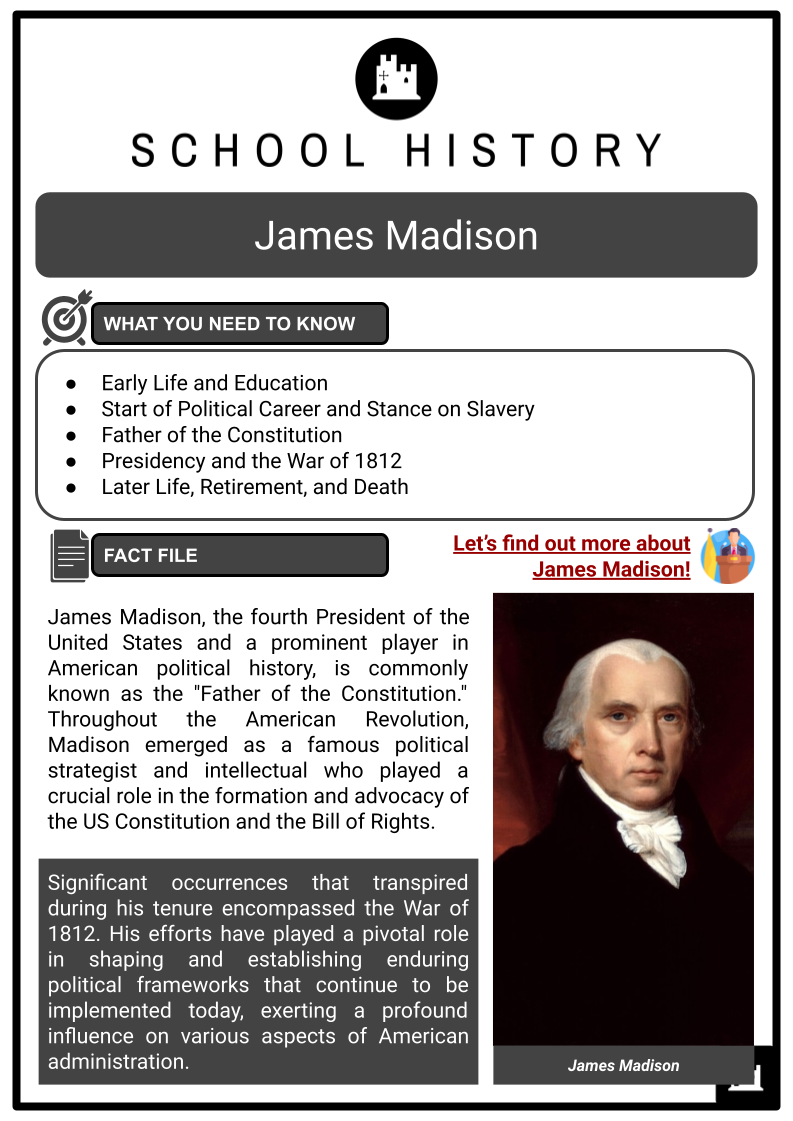
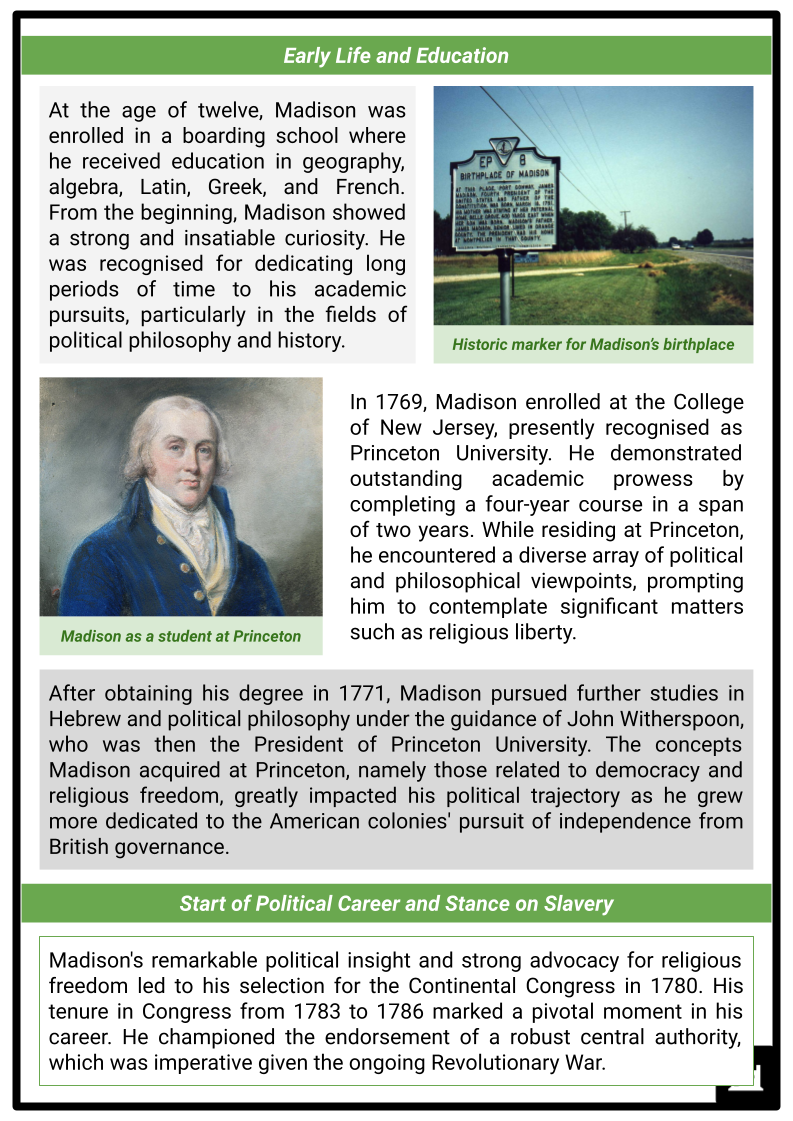
Student Activities
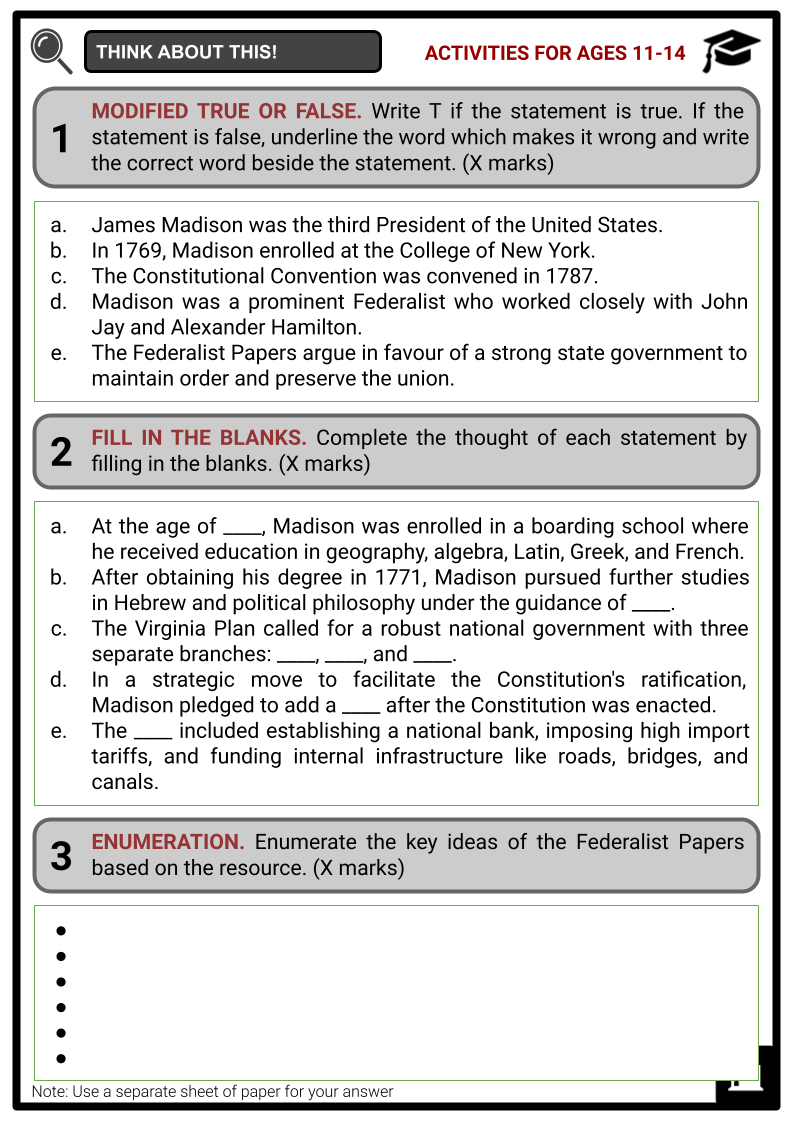
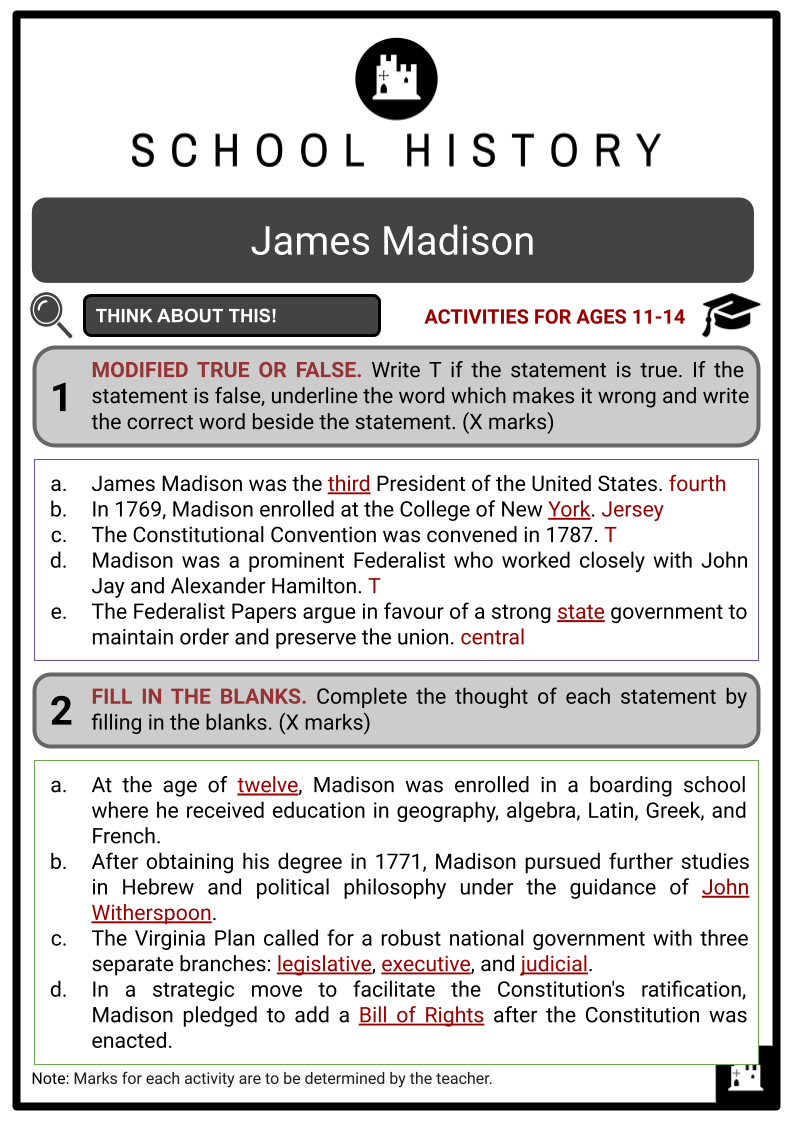
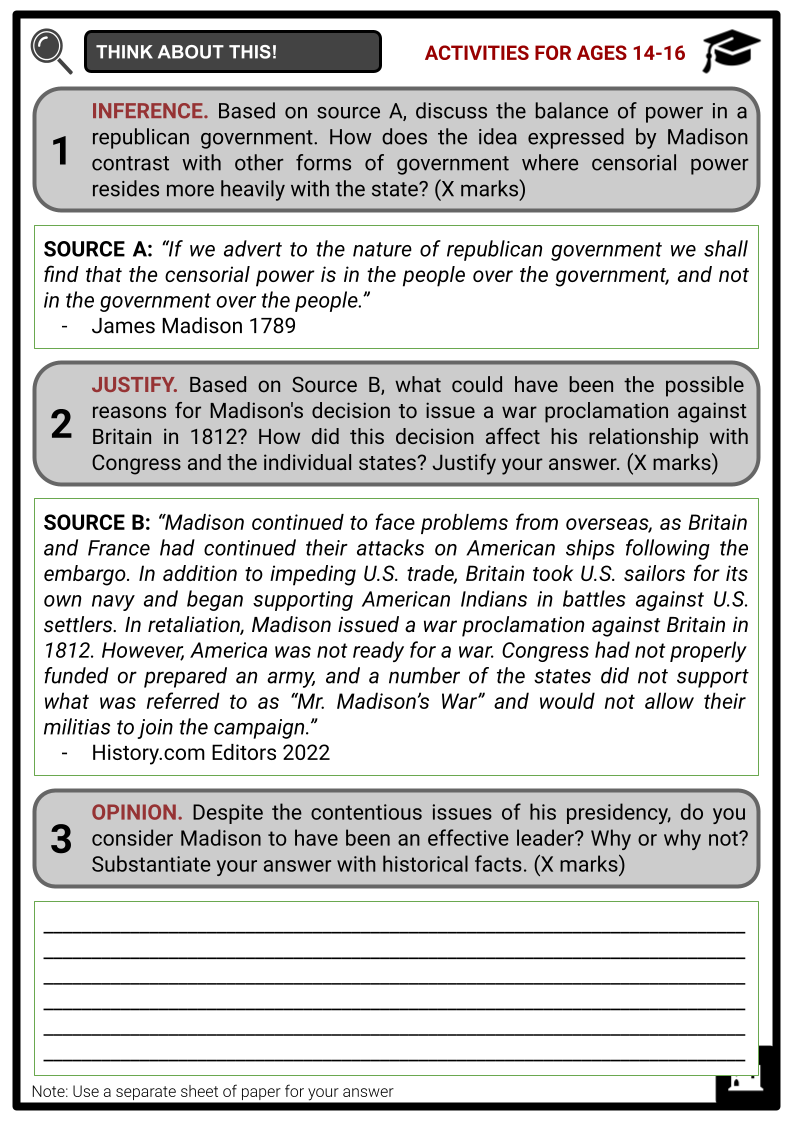
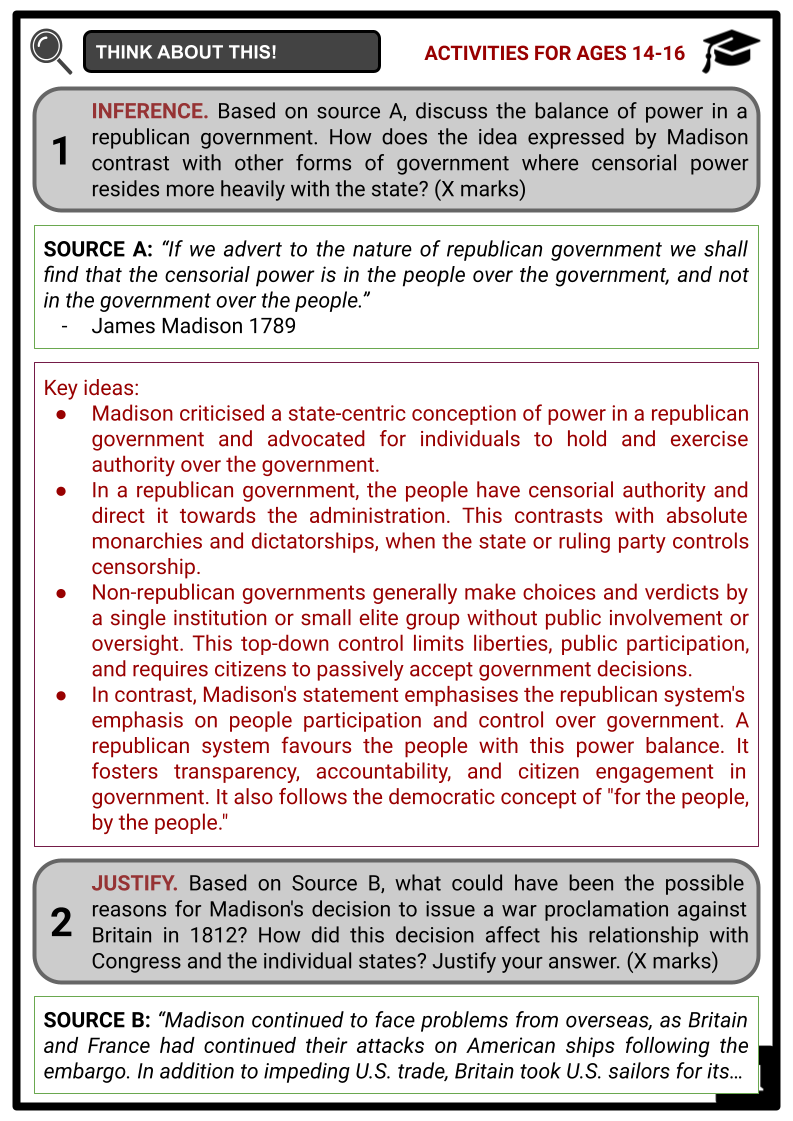
Summary
- Early Life and Education
- Start of Political Career and Stance on Slavery
- Father of the Constitution
- Presidency and the War of 1812
- Later Life, Retirement, and Death
Key Facts And Information
Let’s find out more about James Madison!
James Madison, the fourth President of the United States and a prominent player in American political history, is commonly known as the "Father of the Constitution." Throughout the American Revolution, Madison emerged as a famous political strategist and intellectual who played a crucial role in the formation and advocacy of the US Constitution and the Bill of Rights. Significant occurrences that transpired during his tenure encompassed the War of 1812. His efforts have played a pivotal role in shaping and establishing enduring political frameworks that continue to be implemented today, exerting a profound influence on various aspects of American administration.
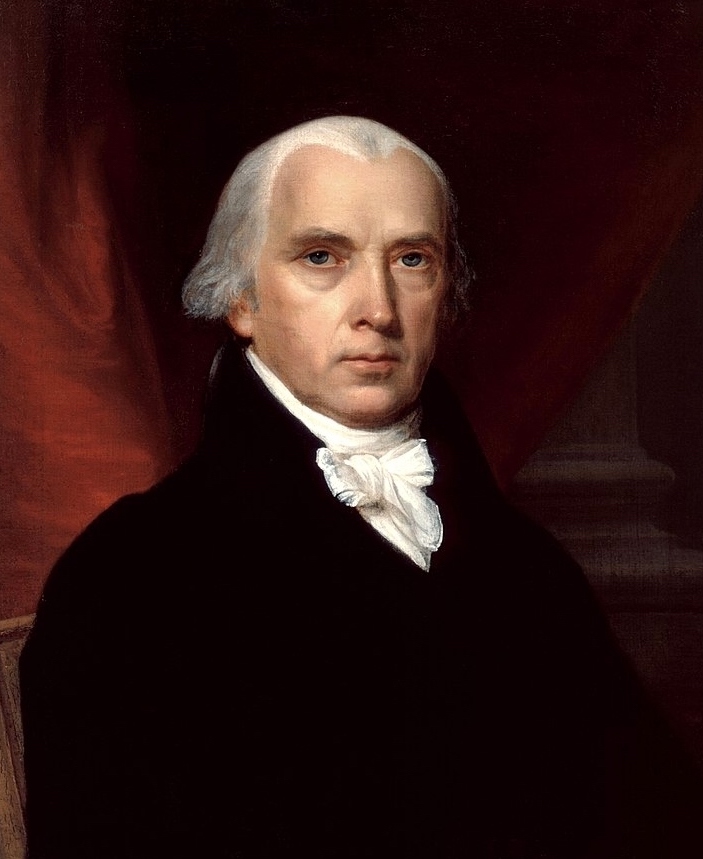
Early Life and Education
- At the age of twelve, Madison was enrolled in a boarding school where he received education in geography, algebra, Latin, Greek, and French. From the beginning, Madison showed a strong and insatiable curiosity. He was recognised for dedicating long periods of time to his academic pursuits, particularly in the fields of political philosophy and history.
- In 1769, Madison enrolled at the College of New Jersey, presently recognised as Princeton University. He demonstrated outstanding academic prowess by completing a four-year course in a span of two years. While residing at Princeton, he encountered a diverse array of political and philosophical viewpoints, prompting him to contemplate significant matters such as religious liberty.
- After obtaining his degree in 1771, Madison pursued further studies in Hebrew and political philosophy under the guidance of John Witherspoon, who was then the President of Princeton University. The concepts Madison acquired at Princeton, namely those related to democracy and religious freedom, greatly impacted his political trajectory as he grew more dedicated to the American colonies' pursuit of independence from British governance.
Start of Political Career and Stance on Slavery
- Madison's remarkable political insight and strong advocacy for religious freedom led to his selection for the Continental Congress in 1780. His tenure in Congress from 1783 to 1786 marked a pivotal moment in his career. He championed the endorsement of a robust central authority, which was imperative given the ongoing Revolutionary War.
- Among the various occurrences in Madison's initial political trajectory, his participation in the Philadelphia Constitutional Convention in 1787 stands out as particularly significant. He implemented a pioneering system of governance in response to the shortcomings of the Articles of Confederation. His 'Virginia Plan' catapulted him into the spotlight during the event and acted as the driving force behind the discussions.
- Madison's initial participation in politics acted as a catalyst for his subsequent achievements. His crucial involvement during the Constitutional Convention and his contributions throughout the Revolutionary War showcased his unwavering commitment to democracy and his visionary aspirations for the future of the United States. His support for a robust central government, a well-functioning constitution, and the protection of religious liberties propelled him to a position of influence in American politics.
- However, despite championing freedom and rights in his political work, Madison was an enslaver, which creates a complex picture of his stance towards slavery. He inherited around 100 enslaved people from his father, and they worked on his Montpelier plantation.
- Madison also argued for the continuation of the slave trade in the Convention in 1787, expressing concern that a sudden end to the trade would disrupt the economies of Southern states. However, he was also a proponent of the controversial "three-fifths" compromise that counted enslaved people as three-fifths of a person for representation purposes, which indirectly acknowledged the enslaved population while reinforcing a system of racial inequality.
- Towards the end of his life, Madison served as the president of the American Colonization Society, an organisation that promoted the resettlement of freed African Americans to Africa. Despite advocating for resettlement, Madison did not emancipate his own enslaved people in his will.
- This contradiction between Madison's political philosophy and his personal actions reflects the complex relationship many Founding Fathers had with slavery, often wrestling with the contradiction between their beliefs in liberty and equality and their economic reliance on the institution of slavery.
Father of the Constitution
- The Constitutional Convention was convened in 1787 in reaction to the insufficient central authority that existed under the Articles of Confederation. The central authority prohibited the imposition of taxes, regulation of trade, and modification of the Articles of Confederation without the unanimous consent of all states.
- Neither the federal judicial system nor the executive branch existed to interpret or enforce laws. These restrictions caused political and economic problems and highlighted the need for a more powerful national government, which is why the U.S. Constitution replaced them.
- As a representative of Virginia, Madison arrived equipped with his idea for the Virginia Plan, a new form of government. This concept called for a robust national government with three separate branches—legislative, executive, and judicial—that work together to prevent undue dominance. When the plan was adopted, the ineffective confederation model was essentially abolished, and the foundation for the current American government system was established.
- Madison made contributions outside of the convention as well. He was a prominent Federalist who worked closely with John Jay and Alexander Hamilton to create the collection of writings known as the Federalist Papers.
- These papers provided lucid interpretations and arguments for the Constitution's provisions in an effort to uphold its values and secure adoption. Madison authored 29 essays on various subjects, such as the appropriate distribution of authority, the benefits of a large republic, and the dangers of factions.
Key Ideas of the Federalist Papers
- Strong Central Government
- The Federalist Papers argue in favour of a strong central government to maintain order and preserve the union.
- They express concern about the weaknesses of the Articles of Confederation and their ineffective federal government.
- Balancing Power through Federalism
- The Papers advocate for a federal system where power is divided between the central and state governments, effectively balancing power and safeguarding against any potential abuse.
- Checks and balances
- They suggest a system of checks and balances through the separation of powers among the legislative, executive, and judicial branches.
- This system prevents any one branch from gaining too much power.
- Large republic
- The authors argue that a large republic would best protect individual freedoms and prevent a majority from trampling on the rights of the minority.
- Dangers of Factions
- The Papers consider 'factions' or party groups as dangerous to the democratic process.
- A large republic would help control the effects of factions since it would be harder for any one group to gain dominant power.
- Proposed Constitution as a Solution
- The Federalist Papers emphasise that the proposed Constitution provides the best solution for effectively governing the United States, arguing that it provides a fair and balanced approach to governance.
- The lack of a Bill of Rights in the original Constitution caused apprehension among anti-Federalists, who opposed the instrument due to their concerns about the possible excessive power of the new central government. In response to these critiques and in a strategic move to facilitate the Constitution's ratification, Madison pledged to add a Bill of Rights after the Constitution was enacted.
- A representative from Virginia at the time, James Madison, fulfilled his pledge at the First United States Congress in 1789. He put out a number of changes intended to protect people's rights from intrusion by the state. These originally proposed amendments underwent extensive revision and reduction to create the 10 amendments that make up the U.S. Bill of Rights.
Ten Amendments to the Bill of Rights
- First Amendment
- Protects freedom of speech, religion, the press, and the right to a peaceful assembly
- Second Amendment
- Protects the right to bear arms
- Third Amendment
- Prohibits the quartering of soldiers in private homes without the owner's consent during peacetime
- Fourth Amendment
- Protects against unreasonable searches and seizures and requires warrants to be judicially sanctioned and supported by probable cause
- Fifth Amendment
- Sets out rules for indictment by grand jury and eminent domain, protects the right to due process, and prohibits self-incrimination and double jeopardy
- Sixth Amendment
- Protects the right to a fair and speedy public trial by jury, including the rights to be informed of the accusations, to confront the accuser, to obtain witnesses, and to retain counsel
- Seventh Amendment
- Provides for the right to trial by jury in certain civil cases, according to common law
- Eighth Amendment
- Prohibits excessive fines and excessive bail, as well as cruel and unusual punishment
- Ninth Amendment
- Asserts the existence of unenumerated rights retained by the people
- Tenth Amendment
- Limits the powers of the federal government to those delegated to it by the Constitution
- Originally intended to be additions to the main body of the Constitution, Madison's amendments were eventually added as an additional set of articles. Since then, these amendments have had a significant impact on how the United States defines fundamental political liberties and justice principles.
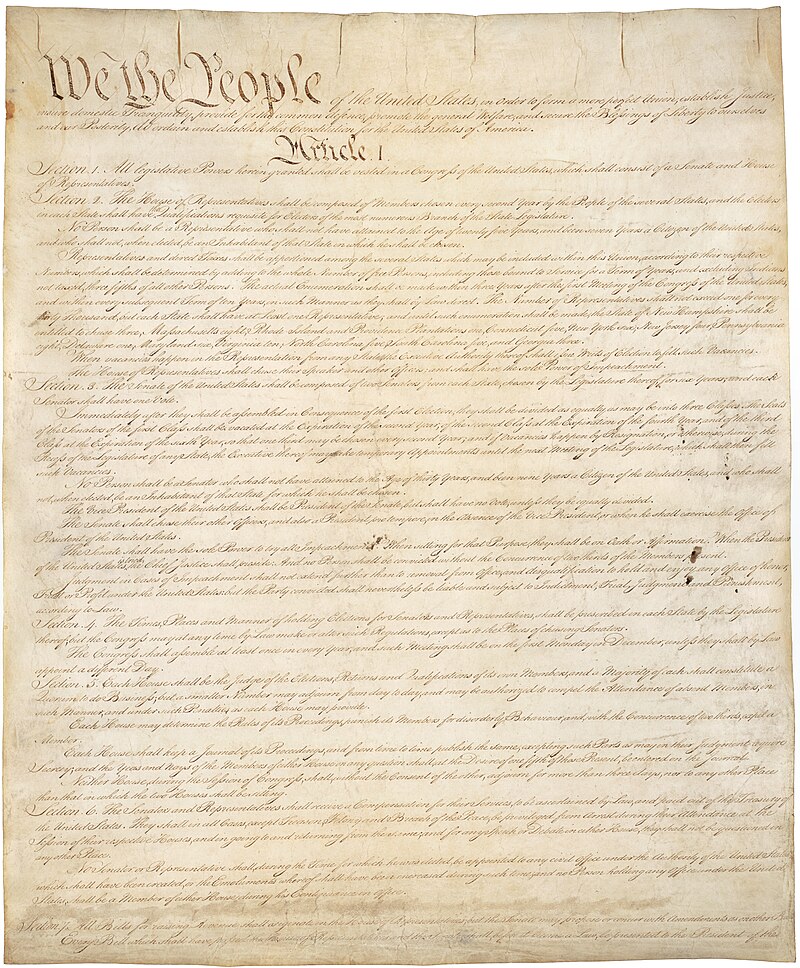
Presidency and the War of 1812
- James Madison's presidency, spanning from 1809 to 1817, marked a pivotal era in American history as it witnessed the nation's inaugural involvement in a military confrontation following the Revolution—the War of 1812. Madison held the position of president for two back-to-back administrations, during which he enacted substantial legislative initiatives and oversaw crucial events that influenced the nature of the United States.
- Madison placed great importance on foreign diplomacy during his tenure as president. The United States became entangled in an intricate network of foreign disputes, namely with Britain and France. The War of 1812 was a momentous occurrence that took place under the administration of James Madison.
- Despite Madison's initial inclination towards peace, escalating international tensions compelled him to undertake the arduous choice of declaring war on Britain, signifying the United States' first openly proclaimed conflict since the Revolution.
- Two factors were primarily responsible for starting the war. The first factor was the ongoing naval conflicts with Britain, resulting in restrictions on American trade with France and the compulsory recruitment of American sailors into the British navy. The second factor resulted from increasing pressure from tenacious Congressmen who vigorously lobbied for the annexation of Canadian regions that are currently under British rule.
- Madison tried to advance American interests diplomatically but failed. He then pressed Congress to declare war in June 1812 due to British naval aggression and internal turmoil. Despite the inconvenience, his move showed his dedication to US commercial interests and sovereignty.
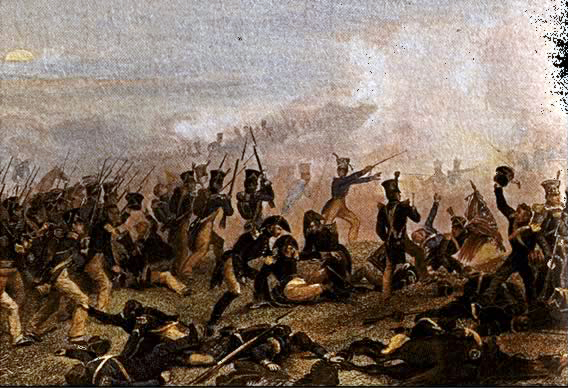
- Madison prioritised domestic progress as president. He took steps to boost the economy and infrastructure. Secretary of State John Quincy Adams and Speaker of the House Henry Clay supported the American System, which included establishing a national bank, imposing high import tariffs, and funding internal infrastructure like roads, bridges, and canals.
- This system supported the country's manufacturing, finance, and infrastructural sectors to promote economic growth and independence. Madison championed this strategy, despite his misgivings about government intervention in several areas. The American System worked hard to create a strong and prosperous US.
- Nonetheless, Madison’s rule was not devoid of criticism. The Federalist Party demonstrated opposition to certain ideas proposed by Madison, particularly those pertaining to the war and economic policy. These confrontations highlighted the long-lasting political tensions of the period.
- The economic efforts of Madison's presidency faced criticism. The acceptance of the American System provoked both approval and resistance. The imposition of tariffs encountered resistance from multiple Southern and Western states that heavily relied on agricultural exports. In addition, there were issues raised regarding the legitimacy of establishing a national bank and using federal funds for domestic improvements.
- The conclusion of the War of 1812 had a tremendous impact on Madison's second term as president. The battle posed a rigorous test of the emerging nation's resilience and ability to protect its rights on the international stage. Although America faced initial challenges and the devastating deed of the British army burning down the White House and Capitol in 1814, the country ultimately witnessed a turnaround with the victory in the Battle of New Orleans in 1815.
- Madison's handling of the aftermath of the War of 1812 resulted in a division in public sentiment. The Treaty of Ghent proved ineffective in resolving crucial causes that had contributed to the war, particularly concerning maritime rights. This led to widespread condemnation from many who considered that the war had been conducted without attaining any significant consequence.
- However, the end of the war marked the beginning of a period characterised by peaceful and prosperous economic conditions, commonly referred to as the "Era of Good Feelings." Between 1815 and 1825, there was a significant decline in political conflict between the Federalist Party and the Democratic-Republican Party.
- Madison's administration, albeit facing challenges, exhibited his commitment to safeguarding American autonomy and promoting domestic advancement. His strategic decisions and actions guided the United States over a tumultuous period, exerting a significant impact on the nation's identity and confirming the strength of the just-formed republic.
Later Life, Retirement, and Death
- Following the conclusion of his second term in office in March 1817, Madison willingly retired from the realm of politics and retreated to his estate, Montpelier, located in Orange County, Virginia. Madison dedicated a significant portion of his time to overseeing the operations of his farm.
- Despite his withdrawal from politics, he continued to actively engage in matters of public concern. He consistently engaged in meetings and corresponded with significant political figures, providing counsel and viewpoints on a wide range of subjects.
- Madison's engagement in educational matters grew throughout his years after serving as president, namely in relation to the establishment of the University of Virginia. Madison, together with his colleague Thomas Jefferson, who established the institution, held the position of the university's second rector from 1826 until 1834.
- Madison's retirement was focused on safeguarding and recording the history of the American Revolution and the early Republic. He acknowledged the significance of establishing precise historical documentation for future generations. To achieve this goal, he began the arduous process of transcribing his notes from the Federal Convention of 1787, which served as a vital record of the discussions and actions that resulted in the formation of the U.S. Constitution.
- Madison's retirement was characterised by a conventional, lonely lifestyle, yet not devoid of financial difficulties. Madison, like other plantation owners of his era, encountered financial challenges as a result of fluctuating crop prices and persistent debt. Following his demise, his estate was burdened with substantial financial liabilities.
- On 28 June 1836, at his Montpelier residence in Virginia, Madison passed away at the age of 85. His death signified the conclusion of the cohort of presidents who held office during the Revolutionary era. He left behind a substantial political inheritance. His participation in the creation of the U.S. Constitution and his contribution to the writing of the Federalist Papers established his importance as a key figure in defining the early American republic.
- Madison's presidency, albeit characterised by contentiousness and intricacy, exerted a substantial impact on the subsequent trajectory of the country. The individual's worldwide and economic initiatives, coupled with his dedication to promoting American autonomy and domestic growth, have played a pivotal role in shaping the contemporary United States.
Image Sources
- https://upload.wikimedia.org/wikipedia/commons/2/20/James_Madison%28cropped%29%28c%29.jpg
- https://upload.wikimedia.org/wikipedia/commons/thumb/6/6c/Constitution_of_the_United_States%2C_page_1.jpg/800px-Constitution_of_the_United_States%2C_page_1.jpg
- https://upload.wikimedia.org/wikipedia/commons/6/6c/Battle_of_Lundys_Lane.jpg
Frequently Asked Questions
- Who was James Madison?
James Madison was the fourth President of the United States, serving from 1809 to 1817. He was also one of the Founding Fathers and a pivotal contributor to the drafting of the United States Constitution.
- What is James Madison's most famous contribution to the Constitution?
James Madison is particularly known for the Virginia Plan, which he presented at the Constitutional Convention. The plan proposed a bicameral legislature, with representation based on population, among other key features that influenced the final Constitution.
- What is James Madison's legacy in American history?
James Madison is remembered as a key architect of the U.S. Constitution, a champion of individual rights, and a skilled political thinker. His contributions to the Constitution and the Bill of Rights have had a lasting impact on the structure of the American government.
